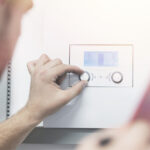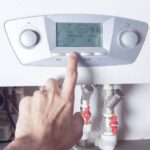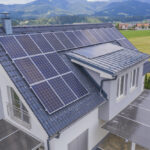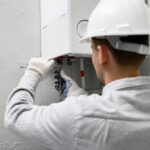Theair exchange in homes is essential for maintaining a healthy environment and comfortable.
The choice between natural ventilation and mechanical ventilation depends on various factors, including costs, energy efficiency and the specific needs of the home and its inhabitants.
Cos 'is air exchange in homes?
Theair exchange refers to the process of replacing stale air inside a building with fresh air from outside.
This process is essential to eliminate pollutants, humidity and odors, thus improving the quality of indoor air.
Importance of air exchange
Adequate air exchange is essential for health and well-being.good ventilation reduces the concentration of allergens, dust, bacteria and other contaminants.
Furthermore, it helps prevent humidity and mold problems, contributing to maintain the structural integrity of the home.
Natural ventilation
Thenatural ventilation exploits the openings present in the structure of the building, such as windows and doors, to allow air movement.
This method is based on simple physical principles and does not require the use of mechanical devices.
Principles of ventilation natural
The movement of air innatural ventilation occurs thanks to the pressure difference between the inside and outside of the home.|| |118
L’aria calda all’interno tende a salire e uscire dalle aperture superiori, mentre l’aria fresca entra dalle aperture inferiori, creando un flusso continuo.
Advantages of natural ventilation
Thenatural ventilation offers numerous benefits. It is an economical and simple method, since it does not require the installation of complex equipment.
Furthermore, it can help reduce energy costs, especially during shoulder seasons, when heating or cooling can be reduced thanks to natural air exchange.
Disadvantages of natural ventilation
Despite its advantages, natural ventilation also has limitations.
Its effectiveness depends greatly on byclimatic conditions and the arrangement of openings in the building. Furthermore, it does not offer precise control over airflow and may be ineffective in particularly polluted or noisy environments.
Mechanical ventilation
Themechanical ventilation| ||140 utilizza dispositivi come ventilatori e condotti per garantire un ricambio d’aria controllato.
This system is particularly useful in modern buildings with a high degree of thermal insulation, where natural ventilation may not be sufficient.
Types of mechanical ventilation systems
There are different types of mechanical ventilation systems. The simplecontrolled mechanical ventilation (VMC) provides a continuous flow of fresh air.
The VMC with heat recovery is more advanced and allows for recovery heat from the exhausted air, improving energy efficiency.
Finally, the decentralized VMC is ideal for renovations, as it requires minimal interventions on existing structures.
Advantages of mechanical ventilation
One of the main advantages of mechanical ventilation is the precise control it offers over air exchange.
It is possible to adjust the air flow according to the specific needs of the home, ensuring constant air quality.
In addition to this, heat recovery systems help reduce energy consumption, making the home more efficient.
Disadvantages of mechanical ventilation
Mechanical ventilation systems can have higher installation and maintenance costs than natural ventilation.
They then require an energy source to operate, which can increase operating costs.
Comparison between natural and mechanical ventilation
The choice between natural and mechanical ventilation depends on various factors.
Both systems have their advantages and disadvantages and the final decision should be based on the specific needs of the home and its occupants.
Energy efficiency
Natural ventilation can be very energy efficient energy perspective, especially during mild seasons.
However, in extreme climates, mechanical ventilation with heat recovery can offer better control over indoor temperatures, reducing the need for additional heating or cooling.
Air quality
Mechanical ventilation offers superior control over indoor air quality, thanks to the ability to filter incoming air.
This is particularly important in urban areas or in environments with high levels of pollution.
Installation and maintenance costs
Natural ventilation does not require complex equipment.
Mechanical ventilation , on the other hand, involves higher initial costs and requires regular maintenance to ensure efficient operation.
Which system to choose?
The choice of the most suitable ventilation system depends on the specific characteristics of the home and the needs of the occupants.
Typically, modern homes benefit from a mechanical ventilation system, especially in areas with extreme climates or high levels of pollution.
Le case più vecchie o situate in climi miti possono trarre vantaggio dalla ventilazione naturale.
Laws and regulations
In Italy, there are specific regulations that regulate the ventilation of homes. These regulations establish the minimum requirements to guarantee adequate air exchange, helping to maintain a healthy and safe internal environment.
Case study: renovation of a home
A practical example of choice and installation of a ventilation system can be seen in the renovation of a home.
In this case, the choice of a VMC with heat recovery made it possible to improve the quality of the internal air and to reduce energy costs, offering a comfortable and healthy environment for occupants.
In conclusion
Air exchange is essential to maintaining a healthy and comfortable indoor environment.|| |214
La scelta tra ventilazione naturale e meccanica dipende da vari fattori, inclusi i costi, l’efficienza energetica e le esigenze specifiche dell’abitazione.
Both systems have their advantages and disadvantages and the final decision should be based on the specific needs of the home and its occupants.
FAQ
What is the difference between natural and mechanical ventilation?
The Natural ventilation uses openings such as windows and doors to allow air movement, while mechanical ventilation uses devices such as fans to ensure controlled air exchange.
What are the benefits of natural ventilation?|| |226
La ventilazione naturale è economica e semplicenon richiede apparecchiature complesse e può ridurre i costi energetici.
What are the benefits of mechanical ventilation?
Mechanical ventilation offers control precise on air exchange, maintains constant air quality and can be integrated with heat recovery systems to improve energy efficiency.
When is it best to use mechanical ventilation?
Mechanical ventilation is recommended in modern buildings with high thermal insulation, in areas with extreme climates or in urban areas with high levels of pollution.
What are the costs of installing a mechanical ventilation system ?
Costs vary depending on the type of system and the specific characteristics of the home. Typically, heat recovery systems are more expensive but offer better energy performance.
How can I improve the air quality in my home?
In addition to choosing an adequate ventilation system, it is important to keep the air filters clean and avoid the use of polluting chemicals and ensure good maintenance of heating and cooling systems.
Is natural ventilation sufficient in all seasons?
Natural ventilation may be effective in mild seasons, but may not be sufficient in extreme climates where more precise control of temperature and humidity is necessary.
What regulations regulate the ventilation of homes in Italy?
Italian regulations establish the minimum requirements for ensure adequate air exchange in homes, helping to maintain a healthy and safe internal environment.











